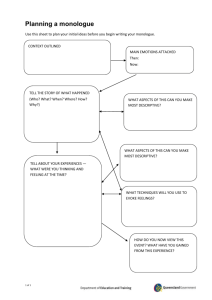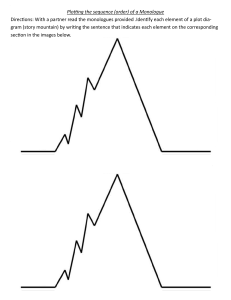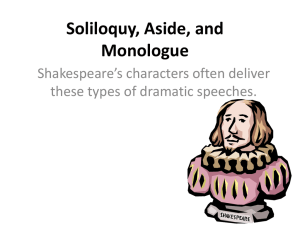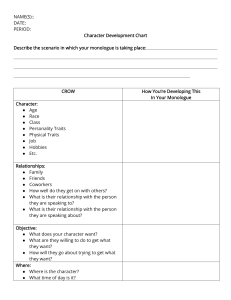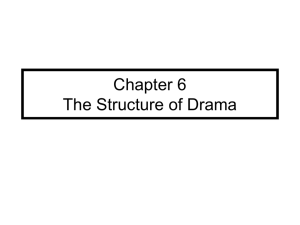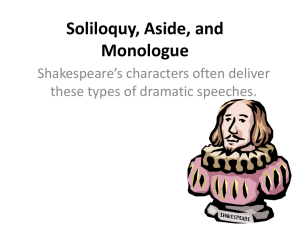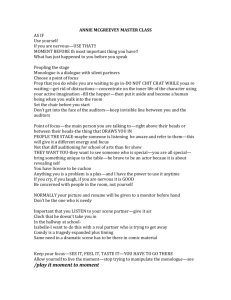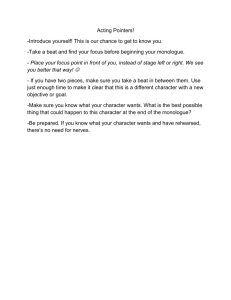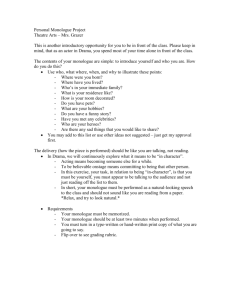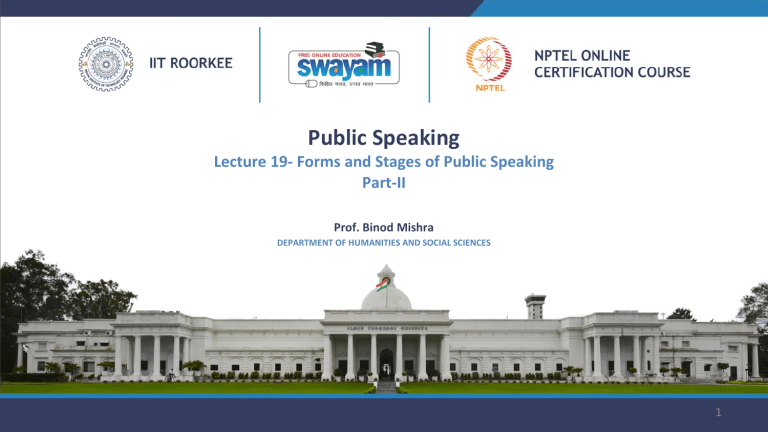
Public Speaking Lecture 19- Forms and Stages of Public Speaking Part-II Prof. Binod Mishra DEPARTMENT OF HUMANITIES AND SOCIAL SCIENCES 1 All the world's a stage, And all the men and women merely players; They have their exits and their entrances, And one man in his time plays many parts, His acts being seven ages. -Shakespeare This Photo by Unknown Author is licensed under CC BY-SA 2 Public Speaking and Stages ❑ Stages have always been a site of persuasion. ❑ Since ancient times, stages were the only platform of instruction wrapped in entertainment. ❑ Through the medium of entertainment, the intended message reaches the common masses. This Photo by Unknown Author is licensed under CC BY-SA 3 Soliloquy Dialogue Types of Dramatic Speeches Monologue Aside 4 Soliloquy ❑ According to Merriam-Webster, a soliloquy is “a long, usually serious spoken discourse that a character in a play delivers to an audience and that reveals the character's thoughts.” ❑ It is a literary device. ❑ Its purpose is to channel the inner thoughts and feelings of the character for the audience. ❑ This provides insight into a character’s emotions and reflections. 5 Example of Soliloquy To be, or not to be–that is the question: Whether ’tis nobler in the mind to suffer The slings and arrows of outrageous fortune Or to take arms against a sea of troubles And by opposing end them. To die, to sleep– No more–and by a sleep to say we end The heartache, and the thousand natural shocks That flesh is heir to. ‘Tis a consummation Devoutly to be wished. To die, to sleep– To sleep–perchance to dream: ay, there’s the rub, For in that sleep of death what dreams may come When we have shuffled off this mortal coil, Must give us pause. - Shakespeare (Hamlet Act 3, Scene 1) This Photo by Unknown Author is licensed under CC BY-NC 6 Monologue ❑ Monologue word, derived from the Greek monos ("single") and legein ("to speak"), is a speech given by a single person to an audience. ❑ According to Encyclopedia Britannica, “monologue, in literature and drama, an extended speech by one person. The term has several closely related meanings.” ❑ A dramatic monologue is any speech of some duration addressed by a character to a second person.” 7 Example of Monologue 'But soft, what light through yonder window breaks? It is the east and Juliet is the sun! Arise, fair sun, and kill the envious moon, Who is already sick and pale with grief That thou her maid art far more fair than she. Be not her maid, since she is envious; Her vestal livery is but sick and green, And none but fools do wear it. Cast it off. It is my lady, O, it is my love! O that she knew she were! She speaks, yet she says nothing; what of that? Her eye discourses, I will answer it. -Shakespeare in Romeo and Juliet This Photo by Unknown Author is licensed under CC BY 8 Example of Dramatic Monologue Be sure I looked up at her eyes Happy and proud; at last I knew Porphyria worshipped me; surprise Made my heart swell, and still it grew While I debated what to do. That moment she was mine, mine, fair, Perfectly pure and good: I found A thing to do, and all her hair In one long yellow string I wound Three times her little throat around, And strangled her. No pain felt she; I am quite sure she felt no pain. - Robert Browning in Porphyria's Lover This Photo by Unknown Author is licensed under CC BY-NC-ND 9 From Barack Obama’s Inaugural Address • • • My fellow citizens: I stand here today humbled by the task before us, grateful for the trust you have bestowed, mindful of the sacrifices borne by our ancestors. I thank President Bush for his service to our nation, as well as the generosity and cooperation he has shown throughout this transition. Forty-four Americans have now taken the presidential oath. The words have been spoken during rising tides of prosperity and the still waters of peace. Yet, every so often the oath is taken amidst gathering clouds and raging storms. At these moments, America has carried on not simply because of the skill or vision of those in high office, but because We the People have remained faithful to the ideals of our forbearers, and true to our founding documents…… In reaffirming the greatness of our nation, we understand that greatness is never a given. It must be earned. Our journey has never been one of short-cuts or settling for less. It has not been the path for the faint-hearted — for those who prefer leisure over work, or seek only the pleasures of riches and fame. Rather, it has been the risk takers, the doers, the makers of things — some celebrated but more often men and women obscure in their labor, who have carried us up the long, rugged path towards prosperity and freedom. (Source:http://content.time.com/time/politics/article/0,8599,1872715,00.html) 10 Dramatic Monologue • • • Dramatic monologue is a poem written in the form of a speech of an individual character. It comprises the narrator’s sense of her/his story and is a remarkable psychological insight into her/his character. It was extensively used by Victorian poet Robert Browning. Examples are My Last Duchess, Porphyria’s Lover, etc Robert Browning This Photo by Unknown Author is licensed under CC BY 11 Soliloquy vs. Monologue Soliloquy Monologue • • When a person delivers a speech to another person or the whole audience. • There is an audience in the play as well as in the theatre. • More than one character is present. • In a Monologue, the character speaks to express not to engage in any conversation. • • • When a person delivers a speech with no audience on stage. The only audience is in the theatres watching the play. Only one character is present on stage. In Soliloquy, character’s innermost thoughts, beliefs, motives are clearly brought forth. 12 Aside ❖ An aside is a dramatic and literary device used for acquainting the audience with the character’s thoughts. It is a common device used in literature and media and can provide essential context for scenes without disrupting the narrative. For example, King: But now, my cousin Hamlet, and my son— Hamlet: [Aside] A little more than kin, and less than kind. King: How is it that the clouds still hang on you? (Shakespeare, Hamlet Act 1, Scene 2) 13 Dialogue ▪ This is the most common technique of dramatic speech as well as everyday communication. ▪ According to Merriam-Webster, dialogue is “the conversational element of literary or dramatic composition”. This Photo by Unknown Author is licensed under CC BY-NCND Muhammad: I couldn’t bear the walls any more. When I came here I felt I needed an audience--- someone to confess my selfpity to. You were asleep? Barani: No, Your Majesty. I was reading a book by Imam Abu Hanifa. Muhammad: Fortunate! You can read when you don’t feel sleepy. I can’t sleep. I can’t read. Even Rumi, who once used to transport me , has become simply a web of words. Do you know, five years ago I actually used to pray to God not to send me any sleep? I can’t believe it now. ( Tughlaq, Scene VIII) 14 Activism and Public Speaking • • • Activism is “the doctrine or practice of vigorous action or involvement as a means of achieving political or other goals, sometimes by demonstrations, protests, etc.”(Dictionary) According to Merriam-Webster, an activist is the “one who advocates or practices activism: a person who uses or supports strong actions (such as public protests) in support of or opposition to one side of a controversial issue.” Public speaking is an essential component of activism which can be divided into five types. 15 Activism and its type Demonstrations and protests Boycott Strikes Letter writing and petitions Social Media Campaigns 16 Importance of Forms and Stages ✓ Boosts one’s self-confidence ✓ Helps in rehearsing one’s talk and presentations ✓ Exposes a speaker to speak in different circumstances/occasions ✓ Enhances effective use of language ✓ Prepares a speaker to face varied audience groups 17 Works Consulted • • • • • • • Kennedy, G. The Art of Persuasion in Greece. Princeton: University Press. 1963. Kluckhohn, Clyde et al. Personality in Nature, Society, and Culture, Knopf, 1956, p. 57. Lucas, Stephen, and Paul Stob. The Art of Public Speaking. McGraw-Hill Education, 2020. Ross, Raymond. Speech Communication, Prentice-Hall Inc., 1977. Soken-Huberty, Emmaline. “5 Types of Activism.” Human Rights Careers, 3 May 2021, https://www.humanrightscareers.com/issues/types-of-activism/. http://thehistorymanatlarge.blogspot.com/2012/09/oratory-in-ancientrome.html#:~:text=Most%20Roman%20citizens%20would%20be,take%20part %20in%20court%20cases. https://www.britannica.com/art/monologue 18 “You never know what is enough unless you know what is more than enough.” -William Blake Thank You 19
